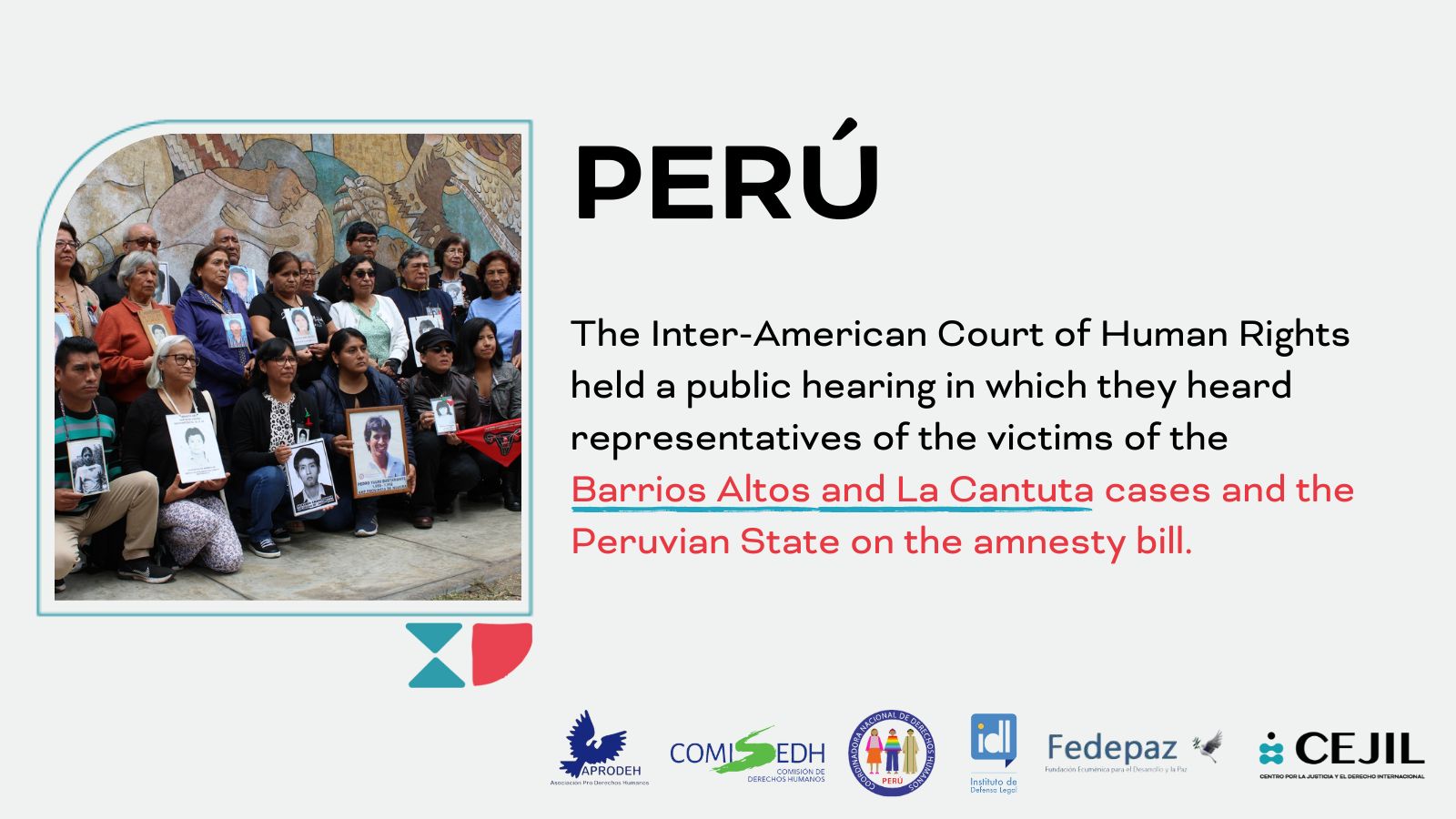






Lima, Peru, June 18, 2024. – In an urgent public hearing, the Inter-American Court of Human Rights (IACourtHR) heard from organizations and representatives of victims of the Barrios Altos and La Cantuta cases regarding the bill approved by the Peruvian Congress that favors impunity for crimes against humanity. The law would allow individuals investigated, prosecuted, and convicted of crimes against humanity to be released without guaranteeing justice or compliance with the sentences imposed, which contradicts the State’s obligation to investigate and punish grave human rights violations committed in Peru.
At the beginning of the hearing, the President of the Court, Judge Nancy Hernández López, pointed out that the Court has precedents in analyzing similar urgent situations, such as in March 2022 and December 2023 with the release of Alberto Fujimori, and in Guatemala in 2023 with two similar legislative proposals. She referred to Bill No. 6951/2023-CR which was approved in its first vote by Congress earlier this month. This law seeks to declare the statute of limitations for the prosecution of crimes against humanity committed prior to the enforcement of the Rome Statute and the Convention on the Non-Applicability of Statutory Limitations to War Crimes and Crimes against Humanity entered into force. This would promote impunity in all cases from the internal armed conflict that occurred in Peru between 1980-2000, including Barrios Altos and La Cantuta.
On June 13, the Inter-American Court ordered the Peruvian State to suspend this legislative process until it had the necessary information to rule on the request for provisional measures by the representatives of the victims of the Barrios Altos and La Cantuta cases. The Court called a hearing with the victims’ representatives, the State and the Inter-American Commission to the hearing, which was held yesterday The requested measures aim to prevent irreparable harm to the victims’ right to truth and justice, guarantee its non-repetition for society, and ensure compliance with the Court’s rulings.
Both decisions are among the most symbolic and key rulings against obstacles that perpetuate impunity for crimes committed in various corners of the world, not only in Peru, as noted by Commissioner Andrea Pochak, the IACHR Rapporteur on Memory, Truth and Justice, during the hearing. In its Barrios Altos (2001) and La Cantuta (2006) rulings, the IACHR determined that amnesties, pardons and other exemptions from responsibility and punishment are contrary to the American Convention on Human Rights (ACHR) in cases of serious human rights violations.
The law being debated by the Peruvian Congress contradicts the State’s obligation to investigate, prosecute, punish and provide reparations for serious human rights violations committed in Peru, as it seeks to benefit those responsible for these crimes with impunity. It is worth noting that the and various United Nations rapporteurs have expressed their concern about the progress of this initiative, reminding that the non-applicability of statutory limitations to crimes against humanity and war crimes is a principle of international law that Peru has the obligation to respect.
The Center for Justice and International Law (CEJIL), the Association for Human Rights (la Asociación Pro Derechos Humanos, APRODEH), the Legal Defense Institute (IDL), the Ecumenical Foundation for Development and Peace (la Fundación Ecuménica para el Desarrollo y la Paz, FEDEPAZ), the Human Rights Commission (la Comisión de Derechos Humanos, COMISEDH) and the National Coordinator for Human Rights (CNDDHH), organizations representing the victims, consider that once again, there is a new imminent danger against the victims’ right to truth and justice. The three branches of the State have taken positions clearly contrary to fulfilling the international obligations of the ACHR, and therefore only the highest inter-American court can protect the victims’ rights by granting the requested provisional measures.
¡Ayúdanos a continuar este trabajo crítico y urgente con una donación!
DONA AHORA